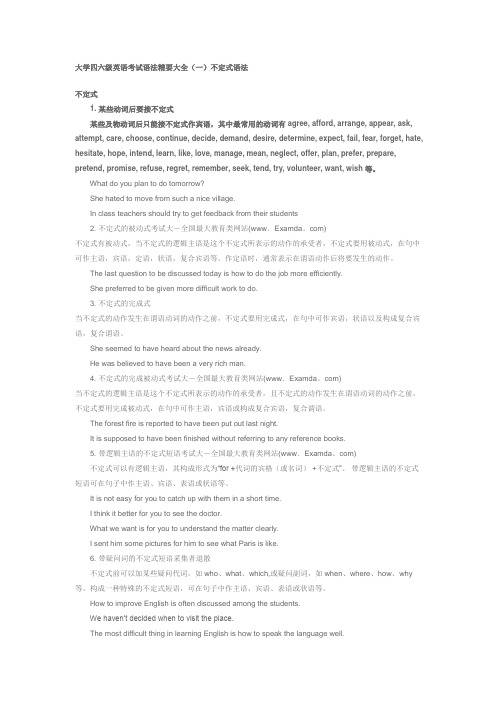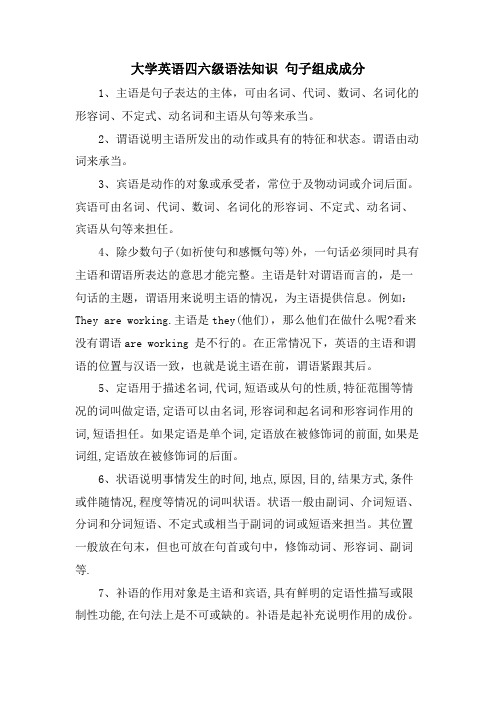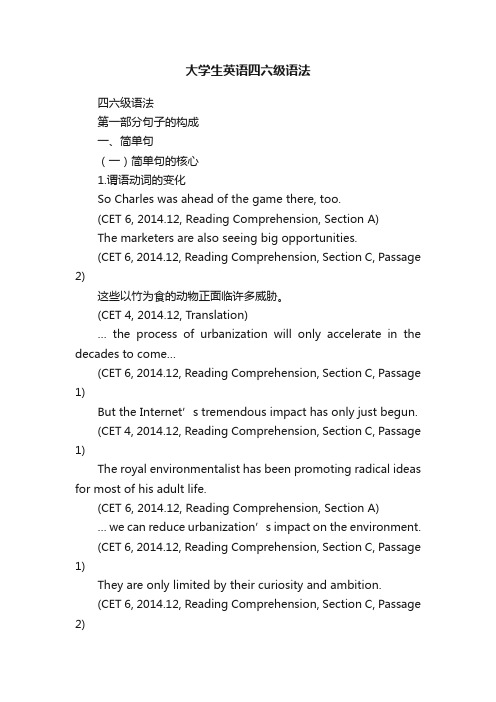大学生英语四六级语法
大学英语四六级语法专项练习与答案

大学英语四六级语法训练大学英语四六级语法训练及答案解析一 . 定语从句专项练习1. The tree, the branches _________ are almost bare, is a very old one.A. whoseB. in whichC. of whichD. which2.We ’ ll never forget the day in 1997 __________ Hong Kong held agrand ceremony marking the handover from Britain to China.A. whenB. thatC. whichD. as3.Who is the lady _________ is waving to you?A. whichB. thatC. whoD. whom4.It was not ________ late at night that we found our lost sheep.A. whenB. unlessC. untilD. while5.The size of the audience, ________ I had expected, was well overten thousand.A. whomB. asC. thatD. who6.Edward is the boy _____ I think scored the winning points forthe basketball team.A. whomB. thatC. whichD. who7.________ the people have become masters of their own country ________science can really serve them.A. It is only then/ thatB. It is only when/ thatC. It was that/ whenD. It was when/ then8. My neighbors on either side of me have painted their houses, ________of course makes my house look shabbier than it really is.A. thatB. asC. whoD. which9. John helped me clean my car _________ was very kind of him.A. and thisB. and thatC. itD. which10. He invested his money in many companies, ____went bankrupt within5 months.A. of whichB. three of whichC. thatD. three of that11. These two areas are similar ____they both have a high rainfallduring this season.A. to thatB. besides thatC. in thatD. except that12. The man, _____we met in the street, came from Haiti.A. thatB. whoC. whoseD. which13. Can you solve such problems _______ raised by the audience?A. what wereB. as wereC. which wereD. that were14. It wasn’ t such a good film she had promised.A. asB. thatC. whatD. like15. There was not a hut in the village _______ he had not brought foodand comfort.A. whichB. to whichC. in whichD. that16. This is the book ________ I was telling you just now.A. about thatB. in thatC. in whichD. about which17. Both the director and the film _____ you’ ve just talked about are very famous.A. whoseB. whichC. whomD. that18.Her father, _______ was lately dead, had left her a large property.A. heB. thatC. whichD. who19.This is the third time we ________ improvements in that equipment.A. are makingB. madeC. have madeD. will make20.All that can be done ______________.A. have been doneB. have doneC. has been doneD. has doneKeys:1. C2. A3.B4.C5.B6.D7. B8. D9.D 10.B 11.C 12.B13. B14. A15. B 16. D 17. D18. D19. C20. C二 .虚拟语气专练1.______ go down town this afternoon, please post the letter for me.A. Had youB. Were you toC. If you didD. Shall you2.You didn ’ t let me drive. If we ______ in turn, you ______ so tired.A. drove, didn’ t getB. were driving, wouldn’ t get’ t get D. had driven, wouldn’ t have gotC. drove, wouldn3.If it ______ for the snow, we _______ the mountain yesterday.A. were not, could have climbedB. were not, could climb’ t been, could climbC. hadn ’ t been, could have climbedD. hadn4.The new airport _______ if they had not stopped working on it.A. would completeB. had been completedC. had completedD. would have been completed5.If he _______ his doctor’ s advice, he ________ alive.A. had taken, might still have beenB. had taken; might still beC. might have taken; had still beenD. took; might still be6.If you ______ in good health, I _______ you go on a trip yesterday.A. were; would have letB. had been; would have letC. had been; had letD. were; had let7.I lost your address, otherwise (or) I _________ you long before.D. should visitA. had visitedB. have visitedC. would have visited8.The guard at the gate insisted that everybody _______ the rules.A. obeysB. obeyC. will obeyD. would obey9.The boss insisted that John ________ unfit for his work.A. wasB. isC. should beD. were10. The officer commanded (ordered) the damaged bridge ____ before dawn.A. must be repairedB. would be repairedC. be repairedD. should have been repaired11. He suggested (advised, proposed) that the wounded _______ tothe hospital as soon as possible.A. had been sentB. should have been sentC. would be sentD. (should) be sent12. He came home with a smile on his face, which suggested that he __ work.A. should findB. had lostC. should have foundD. had found13. Most of the members demanded (requested, required, asked) thatthe meeting ________ till after Friday.A. shouldn’ t put offB. not be put offC. wouldn ’ t be put offD. not put off14. I wish I ________ how to translate this sentence.A. knewB. knowC. have knownD. should know15. –Has Fangfang been to New York?--No, but she wishes she _____.A. wouldB. will next timeC. hadD. had next time16. I wish I _______ the TV program last night.A. could watchB. have watchedC. watchedD. could have watched17. The two strangers talked as if they ______ fiends for years.A. should beB. would beC. have beenD. had been18. When a pencil is partly in a glass of water, it looks as if (though) it_______.A. breaksB. has brokenC. were brokenD. has been broken19. Look at the clouds, it looks as if it _______ rain.A. willB. wouldC. wereD. is going to20. _______ he were trying to teach them all he knew.A. It seemed thatB. They had hopedC. It seemed as ifD. They thoughtKeys:1.B2.D3.C4. D5. B6.B7.C8.B9. A 10. C 11. D 12. D 13.B 14.A15.C16. D17.D18.C 19. D20. C三 .倒装句专项练习1.You often read China Daily. ________ .A. So am IB. So do IC. Nor do ID. Neither can I2.________ find out what happened.A. Until he woke up did heB. Until he woke up toC. Not until did he wake up, heD. Not until he woke up did he3._________ got into the room _______ the telephone rang.A. No sooner had he; whenB. He hardly had; thenC. Hardly had he; whenD. He hardly had; than4.Little _______ about his own health though he was very ill.A. he caredB. he caresC. does he careD. did he care5.________, you would have met him.A. If you were thereB. Should you been thereC. If you went thereD. Had you been there6.Seldom _________ such a funny story as he told us.A. have I heardB. I have heardC. did I listenD. I listened7.So loudly _______ that all the people in the room got a fright.A. he shoutedB. shout heC. did he shoutD. he did shout8.Rarely _______ so difficult a problem.A. she could have faced withB. could have she faced withC. she could have been faced withD. could she have been faced with9.Not a single mistake _______ in the test.A. he madeB. did he makeC. he has madeD. made he10. Hardly _______ the classroom when the class began.A. had he enteredB. he had enteredC. he enteredD. he was entered11.____ France Viuard an excellent political speaker but she was also among the first members of the Democratic Party.A. Not onlyB. If onlyC. OnlyD. Not only was12. _________ should any money be given to a small child.A. On no accountB. From all accountsC. Of no accountD. By all accounts13. So badly ________ in the accident that Simon was delayed in thehospital for treatment.A. did he injureB. he injuredC. was he injuredD. he was injured14. ___________ that they may eventually reduce the amount oflabor needed on construction sites by 90 percent.A. So clever are the construction robotsB. So clever the construction robots areC. Such construction robots are cleverD.Such clever construction robots are15. ________ do we suspect that this district is rich in mineral resources.A. LittleB. A littleC. FewD. A few16. We have done things we ought not to have done and ________undone things to we ought to have done.A. leavingB. will leaveC. leftD. did leave17. _________ no computers, there could have been no satellites or rockets.A. Had there beenB. If there wereC. Should there beD. If there are18. Only after many years of hard work _______ that money alone doesnot lead to happiness and success.A. did I realizeB. I did realizeC. had I realizedD. I had realized19. ___________, but I still like him.A. Selfish though he isB. Selfish as he isC. Selfish he may beD. Whether he is selfish or not20. ___________, I couldn’ t lift the box.A. As I might tryB. Try as I mightC. As try I mightD. Though try I mightKeys: 1. B 2. D 3. C 4.D 5.D 6.A7. C8.D9. B 10. A 11.D 12.A 13.C14. A15. A16. C 17. A18. A19.C20. B四 .非谓语动词专练从 A 、B、C、 D 四个选项中,选出可以填入空白处的最佳选项。
大学英语四六级考试语法精要

大学英语四六级考试语法精要大学英语四六级考试是很多大学生必须面对的一道难题。
而在这一场考试中,语法是必不可少的一部分。
在考试中,学生需要掌握一定的语法知识,才能够在短时间内迅速完成题目,拿到高分。
接下来,我们将带领大家了解大学英语四六级考试语法精要。
一、基础语法在大学英语四六级考试中,基础语法是最为重要的一部分。
学生需要掌握英语的基本语法规则,如名词、动词、形容词、副词、代词、冠词、介词、连词、关系词等。
通过学习这些基础知识,能够提高学生的语言水平,更好地理解和应用英语。
二、时态语态时态和语态是大学英语四六级考试中常考的语法知识点。
在时态方面,学生需要掌握英语中的12个基本时态及其用法。
在语态方面,学生需要重点学习被动语态的构成和使用方法。
三、虚拟语气虚拟语气也是大学英语四六级考试中经常出现的语法知识点。
学生需要掌握虚拟语气的用法,如虚拟语气的条件句、假设句、愿望句、建议句、命令句等等。
学会使用虚拟语气,有助于提高学生的写作和口语表达能力。
四、强调句式强调句式也是大学英语四六级考试中经常考察的语法知识点。
学生需要掌握强调句式的构成和使用方法,如It is…that句型、What…句型、Who…句型、Which…句型等等。
掌握了这些强调句式,学生可以更好地表达自己的观点和想法,并增加表达的说服力。
五、倒装句在大学英语四六级考试中,倒装句也是一个重要的语法知识点。
倒装句的构成和使用方法需要学生认真掌握,尤其是英语中的部分倒装和完全倒装。
学会使用倒装句,不仅可以提高作文和口语表达的技巧,还可以让语言更加生动有趣。
综上所述,大学英语四六级考试语法精要包括基础语法、时态语态、虚拟语气、强调句式和倒装句等多个方面。
掌握这些语法知识点,不仅可以在考试中得到高分,还可以提高学生的英语水平,进一步提高在英语交流中的自信和表达能力。
大学四六级英语考试语法精要大全

大学四六级英语考试语法精要大全(一)不定式语法不定式1. 某些动词后要接不定式某些及物动词后只能接不定式作宾语,其中最常用的动词有agree, afford, arrange, appear, ask, attempt, care, choose, continue, decide, demand, desire, determine, expect, fail, fear, forget, hate, hesitate, hope, intend, learn, like, love, manage, mean, neglect, offer, plan, prefer, prepare, pretend, promise, refuse, regret, remember, seek, tend, try, volunteer, want, wish等。
What do you plan to do tomorrow?She hated to move from such a nice village.In class teachers should try to get feedback from their students2. 不定式的被动式考试大-全国最大教育类网站(www.Examda。
com)不定式有被动式,当不定式的逻辑主语是这个不定式所表示的动作的承受者,不定式要用被动式,在句中可作主语,宾语,定语,状语,复合宾语等。
作定语时,通常表示在谓语动作后将要发生的动作。
The last question to be discussed today is how to do the job more efficiently.She preferred to be given more difficult work to do.3. 不定式的完成式当不定式的动作发生在谓语动词的动作之前,不定式要用完成式,在句中可作宾语,状语以及构成复合宾语,复合谓语。
大学英语四六级语法知识 句子组成成分

大学英语四六级语法知识句子组成成分1、主语是句子表达的主体,可由名词、代词、数词、名词化的形容词、不定式、动名词和主语从句等来承当。
2、谓语说明主语所发出的动作或具有的特征和状态。
谓语由动词来承当。
3、宾语是动作的对象或承受者,常位于及物动词或介词后面。
宾语可由名词、代词、数词、名词化的形容词、不定式、动名词、宾语从句等来担任。
4、除少数句子(如祈使句和感慨句等)外,一句话必须同时具有主语和谓语所表达的意思才能完整。
主语是针对谓语而言的,是一句话的主题,谓语用来说明主语的情况,为主语提供信息。
例如:They are working.主语是they(他们),那么他们在做什么呢?看来没有谓语are working 是不行的。
在正常情况下,英语的主语和谓语的位置与汉语一致,也就是说主语在前,谓语紧跟其后。
5、定语用于描述名词,代词,短语或从句的性质,特征范围等情况的词叫做定语,定语可以由名词,形容词和起名词和形容词作用的词,短语担任。
如果定语是单个词,定语放在被修饰词的前面,如果是词组,定语放在被修饰词的后面。
6、状语说明事情发生的时间,地点,原因,目的,结果方式,条件或伴随情况,程度等情况的词叫状语。
状语一般由副词、介词短语、分词和分词短语、不定式或相当于副词的词或短语来担当。
其位置一般放在句末,但也可放在句首或句中,修饰动词、形容词、副词等.7、补语的作用对象是主语和宾语,具有鲜明的定语性描写或限制性功能,在句法上是不可或缺的。
补语是起补充说明作用的成份。
最常见的是宾语补足语。
名词、动名词、形容词、副词、不定式、现在分词、过去分词都可以在句子中作宾补。
8、表语是用来说明主语的性质,身份,特征和状态。
表语须和系动词一起构成句子的复合谓语。
表语一般放在系动词之后。
表语可以由名词,形容词或起名词和形容词作用的词和短语担任。
9、同位语当两个指同一事物的句子成分放在同等位置时,一个句子成分可被用来说明或解释另一个句子成分,前者就叫做后者的同位语.这两个句子成分多由名词(代词)担任,同位语通常皆放在其说明的名词(代词)之后。
大学生英语四六级语法

大学生英语四六级语法四六级语法第一部分句子的构成一、简单句(一)简单句的核心1.谓语动词的变化So Charles was ahead of the game there, too.(CET 6, 2014.12, Reading Comprehension, Section A)The marketers are also seeing big opportunities.(CET 6, 2014.12, Reading Comprehension, Section C, Passage 2)这些以竹为食的动物正面临许多威胁。
(CET 4, 2014.12, Translation)… the process of urbanization will only accelerate in the decades to come…(CET 6, 2014.12, Reading Comprehension, Section C, Passage 1)But the Internet’s tremendous impact has only just begun.(CET 4, 2014.12, Reading Comprehension, Section C, Passage 1)The royal environmentalist has been promoting radical ideas for most of his adult life.(CET 6, 2014.12, Reading Comprehension, Section A)… we can reduce urbanization’s impact on the environment.(CET 6, 2014.12, Reading Comprehension, Section C, Passage 1)They are only limited by their curiosity and ambition.(CET 6, 2014.12, Reading Comprehension, Section C, Passage 2)Silicon Valley executives are being shamed into adding women to their boards. (CET 6, 2014.12, Reading Comprehension, Section C, Passage 2)The urbanization wave can’t be stopped…(CET 6, 2014.12, Reading Comprehension, Section C, Passage 1)土豪和大妈可能会被收入新版牛津(Oxford)英语词典。
英语四六级句型知识点

英语四六级句型知识点1.主语 + 谓语 + 宾语(SVO):这是英语中最基本的句型结构,如:She eats an apple.(她吃一个苹果。
)2.主语 + 谓语 + 间接宾语 + 直接宾语(SVOO):在这种句型中,直接宾语是动作的承受者,如:She gave me a book.(她给了我一本书。
)3.主语 + 谓语 + 宾语 + 宾语补足语(SVOC):这种句型中,宾语补足语用来补充说明宾语的特征、状态等,如:They made him captain.(他们任命他为队长。
)4.主语 + 系动词 + 表语(SVC):这种句型中,系动词用来连接主语和表语,表示主语的状态、特征等,如:He is a doctor.(他是一名医生。
)5.主语+ 谓语+ 宾语+ 宾语补足语+ 状语(SVOCAd):这种句型中,状语用来修饰动词、形容词、副词等,如:He left the room quietly.(他悄悄地离开了房间。
)6.主语 + 谓语 + 间接宾语 + 直接宾语 + 宾语补足语(SVOOVC):这种句型中,宾语补足语用来补充说明宾语的特征、状态等,如:The teacher asked the student to read the text aloud.(老师要求学生大声朗读课文。
)7.主语 + 谓语 + 宾语 + 宾语补足语 + 状语 + 定语(SVOCAdJ):这种句型中,定语用来修饰名词,如:The book on the table is mine.(桌上的书是我的。
)8.主语 + 谓语 + 宾语 + 宾语补足语 + 状语 + 定语+ 状语(SVOCAdJAd):这种句型中,状语用来修饰动词、形容词、副词等,如:He put the book carefully on the table.(他小心翼翼地把书放在桌子上。
)9.主语 + 谓语 + 不定式短语(SV Infinitive Phrase):这种句型中,不定式短语表示目的、原因等,如:He decided to study abroad.(他决定出国留学。
四六级考试语法
四六级考试语法四六级考试语法总概述Ⅰ.动名词1. 某些动词后要接动名词某些及物动词后能⽤动名词⽽不能⽤不定式作宾语,其中最常⽤动词的有admit, avoid, appreciate, complete, consider, delay, deny, dislike, enjoy, escape, excuse, fancy, finish, forgive, involve, imagine, can’t help, mind, miss, postpone, practise, prevent, quit, resent, risk, resist, suggest等。
She suggested spending another day in the mountain area.There’s no way to escape doing the work.She is considering asking her employer for a rise.Note:①在need、want、require、deserve等动词后的动名词相当于不定式的被动式The clock needs/wants repairing. (=The clock needs/wants to be repaired)The disabled deserve respecting. (=The disabled deserve to be respected.)②在like、hate、prefer等动词后,如果表⽰⼀般倾向,则⽤动名词作宾语;如果指具体的某次发⽣在将来的⾏动,则要⽤不定式。
I like reading books of this kind, but I do n’t like to read that book.She prefers walking to cycling.I prefer to stay at home today.③在remember、forget、regret等动词后,如果⽤动名词作宾语,则表⽰该宾语的动作发⽣在动词谓语的动作之前;如果⽤不定式作宾语,则表⽰宾语的动作发⽣在动词谓语的动作之后I remembered locking the door. (=I remembered that I had locked the door.)I remembered to lock the door (=I remembered that I was to lock the door.)I regret telling you about it. (=I regret that I told you about it.)I regret to tell you he has fallen ill. (=I regret that I am to tell you he has fallen ill.)2. 动名词作介词的宾语动名词可作介词的宾语,与介词⼀起构成介词短语,在句中作定语、状语或表语。
四六级语法知识点详解
四六级语法知识点详解英语四六级考试是大学英语水平考试的一种,对于很多学生来说,语法是其中一个比较难以掌握的部分。
本文将详细解释四六级考试中常见的语法知识点,帮助学生更好地应对考试。
一、时态和语态1. Simple Present Tense(简单现在时)简单现在时表示经常或习惯性发生的动作、真理、客观存在的事实等。
结构:主语 + 动词原形(第三人称单数在动词后加s或es)例句:I eat breakfast every morning.(我每天早上吃早餐)2. Present Continuous Tense(现在进行时)现在进行时表示现在正在进行的动作。
结构:主语 + am/is/are + 动词ing形式例句:She is studying in the library now.(她正在图书馆学习)3. Simple Past Tense(简单过去时)简单过去时表示过去某个时间发生的动作或存在的状态。
结构:主语 + 动词过去式例句:They visited their grandparents last weekend.(他们上周末去看望了他们的祖父母)4. Past Continuous Tense(过去进行时)过去进行时表示过去某个时间正在进行的动作。
结构:主语 + was/were + 动词ing形式例句:I was watching TV when she called me.(她打电话给我时,我正在看电视)5. Simple Future Tense(简单将来时)简单将来时表示将来要发生的动作或存在的状态。
结构:主语 + will + 动词原形例句:We will have a party next week.(我们下周要开个派对)6. Future Continuous Tense(将来进行时)将来进行时表示将来某个时间正在进行的动作。
结构:主语 + will be + 动词ing形式例句:I will be sleeping when you arrive.(当你到达时,我将正在睡觉)7. Passive Voice(被动语态)被动语态用于强调动作的承受者而不是施动者。
大一英语四六级考试知识点
大一英语四六级考试知识点一、词汇英语四六级考试中,词汇是非常重要的一部分,掌握扎实的词汇量是取得好成绩的基础。
以下是大一英语四六级考试常见的词汇知识点:1. 同义词与近义词:在阅读理解中经常会遇到需要替换单词的情况,因此了解同义词与近义词是非常有必要的。
2. 词汇搭配:英语中,同一个词可以搭配不同的词汇,这些搭配在四六级考试的写作和阅读中都会用到。
3. 常用短语和固定搭配:掌握一些常用的短语和固定搭配,可以帮助理解文章的意思,同时也可以在写作中提升表达的水平。
4. 前缀和后缀:了解常见的前缀和后缀,可以帮助我们快速推测单词的意思,提升阅读的速度和准确性。
二、语法语法在英语四六级考试中占据了很大的比重,正确的语法使用是取得高分的必要条件。
以下是大一英语四六级考试常见的语法知识点:1. 时态与语态:英语中有多种时态和语态的使用方式,掌握它们的使用规则对于理解阅读材料和写作非常重要。
2. 从句和状语从句:从句和状语从句常常会出现在阅读理解中,掌握它们的语法结构和使用方法对于理解文章的意思非常重要。
3. 并列句和复合句:并列句和复合句在四六级写作中经常使用,了解它们的使用方法可以提升写作的表达能力。
4. 名词、代词和动词的用法:名词、代词和动词是句子中的核心部分,了解它们的用法可以帮助我们理解句子的结构和意义。
三、阅读技巧在英语四六级考试中,阅读理解是一个重要的测试项目。
以下是大一英语四六级考试常见的阅读技巧:1. 扫读与略读:扫读是快速阅读,用于获取文章的大意和主要信息;略读是有针对性地阅读,用于获取特定的细节信息。
2. 推理与推断:通过阅读材料中的线索和上下文,进行推理和推断,帮助我们理解文章的意思。
3. 标记与笔记:在阅读过程中,可以适当标记或做简短笔记,帮助我们加深对文章内容的理解和记忆。
4. 借助选项:在选择题中,可以借助选项中的信息来帮助我们定位正确答案。
四、写作技巧英语四六级考试的写作部分要求我们能够准确、流利地表达自己的观点。
四六级英语语法汇总
专四必备语法一、时态、语态时态、语态需要掌握的要点:1.表达将来时的形式:(1)在时间、条件、让步从句中,一般现在时代替将来时,但要注意区别从句的类型,如:I’ll tell him when you will ring again. 我告诉他你什么时候再来电话。
(宾语从句)比较:I’ll tell him when you ring again.你再打电话时我告诉他。
(状语从句)(2)在make sure, make certain, see (to it) 后的that从句中,谓语动词用一般现在时代替将来时,如:See to it that you include in the paper whatever questions they didn’t know the answer to last time.(include 不能用will include或其他形式) 2.完成时是时态测试的重点,注意与完成时连用的句型和时间状语:(1)by/between/up to/till +过去时间、since、by the time/when +表示过去发生情况的从句,主句用过去完成时。
如:We had just had our breakfast when an old man came to the door.Between 1897 and 1919 at least 29 motion pictures in which artificial beings were portrayed had been produced.(表示1919年时已发生的情况) (2)by +将来时间、by the time/ when +谓语动词是一般现在时的从句,主句用将来完成时。
如:By the time you arrive in London, we will have stayed in Europe for two weeks.I hope her health will have improved greatly by the time we come back next year.(3)by now、since +过去时间、in/during/for/over/the past/last few(或具体数字)years/days/months,主句用现在完成时, 但在it is +具体时间since/before这一句型中,主句更多的时候不用完成时。
- 1、下载文档前请自行甄别文档内容的完整性,平台不提供额外的编辑、内容补充、找答案等附加服务。
- 2、"仅部分预览"的文档,不可在线预览部分如存在完整性等问题,可反馈申请退款(可完整预览的文档不适用该条件!)。
- 3、如文档侵犯您的权益,请联系客服反馈,我们会尽快为您处理(人工客服工作时间:9:00-18:30)。
四六级语法第一部分句子的构成一、简单句(一)简单句的核心1.谓语动词的变化So Charles was ahead of the game there, too.(CET 6, 2014.12, Reading Comprehension, Section A)The marketers are also seeing big opportunities.(CET 6, 2014.12, Reading Comprehension, Section C, Passage 2)这些以竹为食的动物正面临许多威胁。
(CET 4, 2014.12, Translation)… the process of urbanization will only accelerate in the decades to come…(CET 6, 2014.12, Reading Comprehension, Section C, Passage 1)But the Internet’s tremendous impact has only just begun.(CET 4, 2014.12, Reading Comprehension, Section C, Passage 1)The royal environmentalist has been promoting radical ideas for most of his adult life.(CET 6, 2014.12, Reading Comprehension, Section A)… we can reduce urbanization’s impact on the environment.(CET 6, 2014.12, Reading Comprehension, Section C, Passage 1)They are only limited by their curiosity and ambition.(CET 6, 2014.12, Reading Comprehension, Section C, Passage 2)Silicon Valley executives are being shamed into adding women to their boards. (CET 6, 2014.12, Reading Comprehension, Section C, Passage 2)The urbanization wave can’t be stopped…(CET 6, 2014.12, Reading Comprehension, Section C, Passage 1)土豪和大妈可能会被收入新版牛津(Oxford)英语词典。
(CET 6, 2014.06, Translation)2.主语的变化Many students… have weak skills in mathematics.(CET 4, 2014.12, Reading Comprehension, Section A)That change is the rapid acceleration of urbanization.(CET 6, 2014.12, Reading Comprehension, Section C, Passage 1)Finding ways… seems more realistic ...Finding ways to improve the lives of the remaining 20 percent seems more realistic ... Finding ways to improve the lives of the remaining 20 percent seems more realistic than trying to restore an imaginary golden age.(CET 4, 2014.12, Reading Comprehension, Section C, Passage 2)It is easy to miss amid the day-to-day headlines of global economic recession… (CET 6, 2014.12, Reading Comprehension, Section C, Passage 1)因此,确保大熊猫的生存比以往更重要。
(CET 4, 2014.12, Translation)… the “average” male and “average” female brains were slightly different … (2016.12, CET-4, Reading Comprehension, Section A)Getting enough to eat and enjoying the safety and comfort of living fully on the grid is certainly a good thing…(CET 6, 2014.12, Reading Comprehension, Section C, Passage 1)补充:宾语表语的变化The fashion was to avoid fat.(CET 4, 2014.12, Reading Comprehension, Section B)Record’s suggestion is to prohibit agents from hiring models with a BMI below 18. (2016.12, CET-4, Reading Comprehension, Section C, Passage Two)That means defeating the lock somehow, or breaking a window.(2016.12, CET-4, Reading Comprehension, Section B)(二)简单句的补充You actually love tipping!(2016.12, CET-4, Reading Comprehension, Section C, Passage One)Jamming attacks are absolutely possible.(2016.12, CET-4, Reading Comprehension, Section B)We like the unique nature of that software.(2016.12, CET-4, Reading Comprehension, Section B)… he and his co-author are optimistic about many aspects of the Internet…(CET 4, 2014.12, Reading Comprehension, Section C, Passage 1)In the study, Tel Aviv University researchers searched for sex differences throughout the entire human brain.(2016.12, CET-4, Reading Comprehension, Section A)A designer can’t survive without participating in Paris Fashion Week …(2016.12, CET-4, Reading Comprehension, Section C, Passage Two)人们把现金作为礼物送给家人或亲密朋友时,通常放在红信封里。
(2016.12, CET-4, Translation)To the children of this connected era, the world is one giant social network.(CET 6, 2014.12, Reading Comprehension, Section C, Passage 2)In April, France passed a law setting lower limits for a model’s weight.(2016.12, CET-4, Reading Comprehension, Section C, Passage Two)The most likely type of burglary ( 入室盗窃 ) by far is the unsophisticated crime of opportunity, usually involving a broken window or some forced entry.(2016.12, CET-4, Reading Comprehension, Section B)Over the past three decades, the industry has made some efforts to improve the quality of its offerings.(2016.12, CET-4, Reading Comprehension, Section C, Passage One)大熊猫是熊科中最稀有的成员,主要生活在中国西南部的森林里。
(CET 4, 2014.12, Translation)Consumers, in the U.S. at least, are acting cautiously with the savings …(2016.12, CET-4, Reading Comprehension, Section C, Passage Two)To deal with obesity, a mixture of approaches — including reformulation, taxation and adjusting portion sizes — will be needed.(2016.12, CET-4, Reading Comprehension, Section C, Passage One)复习:Looking around the carriage, I saw quite a few people like him, including a couple offatty children with swollen cheeks pressing against their eyes.(CET 4, 2014.12, Reading Comprehension, Section B)In an editorial released Monday in the American Journal of Public Health, Katherine Record and Bryn Austin made their case for government regulation of the fashion industry.(2016.12, CET-4, Reading Comprehension, Section C, Passage Two)Today, however, despite increasing demand for workers with strong skills in mathematics and science, the proportions of degrees awarded in science, math, and engineering are decreasing.(CET 4, 2014.12, Reading Comprehension, Section A)二、并列句Jamming concerns are nothing new, and they’re not unique to security systems. (2016.12, CET-4, Reading Comprehension, Section B)Today, new problems have emerged in the process of resolving old ones, but the solution is not to go back to the past.(2014.12, CET-4, Reading Comprehension, Section C, Passage 2)在中国文化中,黄颜色是一种很重要的颜色,因为它具有独特的象征意义。
